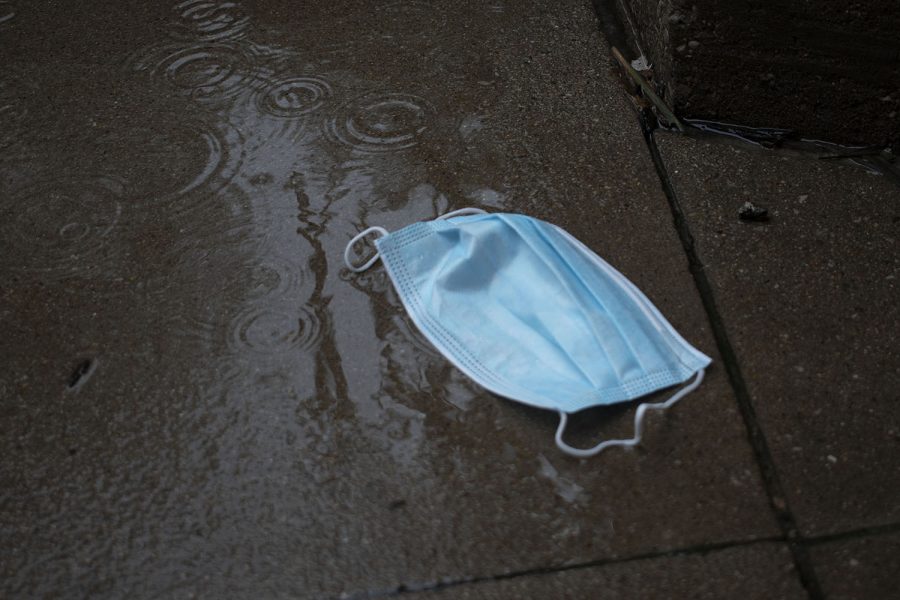Disposable masks can have environmental impact, UI sustainability experts say
As masks are becoming the new normal across the world, they can cause issues for the environment.
Photo Illustration by Raquele Decker.
September 14, 2020
While three main types of facial coverings are currently being used to slow the spread of COVID-19 — reusable, disposable or plastic face shields – experts are looking at how these masks and the virus are affecting the environment.
Iowa City Recycling Coordinator Jane Wilch said reusable masks are a great option and are easy to make with at-home materials. Upcycling and reusing old T-shirts and hair-ties are great ways to create masks with the lowest environmental impact possible, she said.
The Centers for Disease Control and Prevention has guidelines online including helpful instructions on simple ways to make masks from home while assuring the mask is effective.
Wilch said if people must buy masks, to buy them locally. The closer a product is to home, she said, the smaller of a carbon footprint it will have.
Buying masks, she said, is a great way to support local businesses during difficult times.
University of Iowa Sustainability Program Manager Elizabeth MacKenzie said she encourages people to use whatever type of mask best fits into their lifestyle. She said sometimes cleaning masks can be difficult without adequate time or a washing machine, so people need to choose the mask that works best for them.
MacKenzie added that reusable products tend to have less of an environmental impact than disposable options, but this can vary based on when the reusable product is disposed and how it’s disposed of.
RELATED: Iowa City Mayor issues proclamation requiring masks in public
She said lately there have been a lot of cases of people not disposing of their masks properly in the garbage, and instead are putting them in the recycling or littering.
If someone throws masks into recycling, MacKenzie said, the recycling center is required to dispose of the entire load of recycling to the landfills.
There has also been an increase of masks being littered not only throughout Iowa City, but everywhere, MacKenzie said.
“Eventually it [facemasks] washes into sewer drains if it doesn’t get picked up that can contribute to flooding. If those drains get clogged, it can have a threat to any wildlife that might get entangled or ingest those materials,” MacKenzie said. “Once it goes through rivers it ends up in the ocean and that’s why we have a lot of ocean plastics. Any littering of masks is not ideal.”
MacKenzie said typically reusable products do have fewer environmental impacts than disposable options as long they are reused enough times.
UI Director of the Office of Sustainability Stratis Giannakouros said right now, proper recycling can be more difficult because of the risk of contaminating workers. He said there are more ways that people are increasing in waste right now, as well.
“We have all of these plastic masks or PPE and lunches are being prepackaged now, that all adds to our waste profile. None of these are things we would want to control right now, because they keep the campuses safe, but it does add to our waste profile,” he said. “But for good reason, we understand the necessity of these items.”
Wilch said people should look at all of their daily habits, which are reflected in the trash after several months, Wilch said. Masks are important to use, she said, but how people choose to use the mask and dispose of it is important, as well.
“A lot has changed in 2020, but there are still ways to be mindful of your everyday actions with sustainability, it may just look different.” said Wilch.






